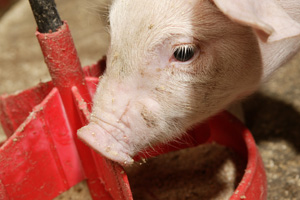Study: Nutritional needs of pigs raised for niche markets

Niche market swine producers may soon have data to precisely match the nutrients in feed with the needs of their pigs.
John Mabry, professor of animal science at Iowa State University, US, is working with the Iowa Pork Producers Association (IPPA) to study the nutritional needs of pigs raised for niche markets. The market is a relatively new development in agriculture with a growing consumer demand.
“In these value-added markets, the primary cost of producing a pig is the same as in the regular, commodity market; it’s the cost of the feed. Feed costs have gone up so much that it comprises about 65 percent of the cost of the production of any animal,” Mabry said.
Mabry said niche pig producers can’t feed animals the same series of eight or more rations fed to commodity pigs.
“Niche pig producers are dealing with genetics that are non-traditional. The animals don’t have the same intake patterns as commodity pigs and they don’t deposit the same amount of lean versus fat,” Mabry said.
A grant from IPPA is helping the Iowa State team study Berkshire pigs to find the correct feed formula. Researchers are monitoring pigs at the ISU Western Research and Demonstration Farm near Castana. Preliminary results show cost savings outweigh the cost of the additional work needed to grind, mix and deliver the rations.
“We think utilizing these feed budgets on intake, specifically for Berkshire pigs, is an opportunity to save anywhere from $10 to $20 a pig. If a producer finishes 18 groups of 200 pigs each year, it could add up to an annual savings of $72,000,” Mabry said.
Steve Kerns, a Berkshire producer near Clearfield and an Iowa State graduate, agrees that niche market pig producers need assistance with record keeping and understanding the needs of their pigs. Kerns is a co-founder of Heritage Berkshire International, one of only five Berkshire farmer groups in the United States.
“Once the results of the study are out, we can fine tune our operations. There’s nothing out there currently and there’s a great demand for Berkshire pork — we can’t keep up with the demand,” Kerns said.
IPPA plans to ask a producer to try the new feed protocols. Iowa State will monitor the implementation to analyze ease of application and cost savings. In addition to publishing a case study in its magazine, IPPA will allocate educational time to niche market production at the Iowa Pork Congress in January.
Source: Iowa State University











